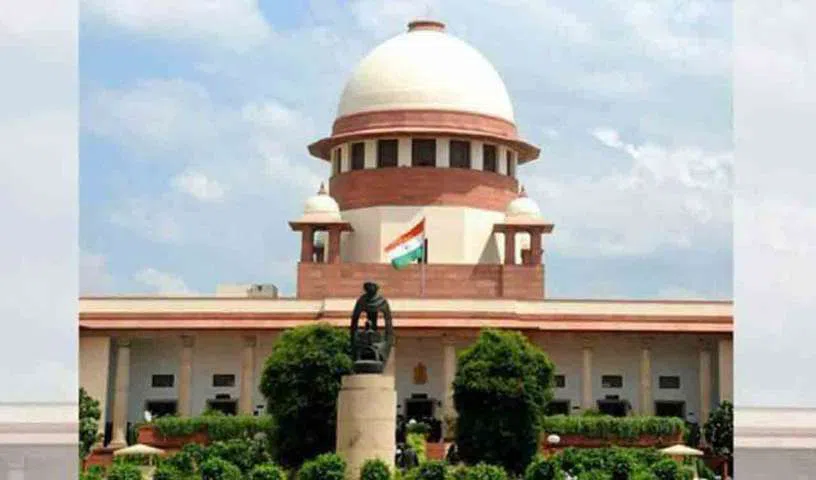Same sex marriage: SC questions how far it can go on marriage equality issue

The court observed that Parliament has specific jurisdiction to legislate on the issue related to marriage and divorce

New Delhi: The Supreme Court on Tuesday asked how it can interfere in petitions relating to marriage equality and how far it can go to deal with the issue.
The Constitution Bench comprising Chief Justice of India DY Chandrachud, Justice Sanjay Kishan Kaul, Justice S Ravindra Bhat, Justice Hima Kohli and Justice PS Narasimha is dealing with a batch of petitions pertaining to ‘marriage equality rights for LGBTQAI+ community.
Senior Advocate Menaka Guruswamy, appearing for one of the petitioners, apprised the court that in India the parliamentary system is constrained unlike in England.
Guruswamy, who urged the court to give marriage right to same-sex couple, said that they have come before the judiciary because their rights are being violated.
The court observed that Parliament has specific jurisdiction to legislate on the issue related to marriage and divorce. “The question really is which are the interstices left in which this court can interfere,” the court said as it added further that comparing this with the British parliament may not be a correct one. The court sought to know how far can the court go on this issue and asked the petitioners’ counsel to address this aspect.
Senior Advocate Menaka Guruswamy submitted that the Parliament is a creature of the Constitution and does not enjoy unfettered sovereignty and the supremacy of the Constitution is protected by the top court which acts as its interpreter. She submitted that the Supreme Court’s power of judicial review under Article 32 over legislative action is part of the basic structure of the Constitution.
Constitutional Courts are empowered to review statutory law to ensure its conformity with constitutional values. Therefore, Courts need not wait for the legislature to enact or amend the law to recognise same-sex marriage, she said.
Guruswamy submitted that the provisions of the Special Marriage Act (SMA) insofar as they do not recognise same-sex marriages are unconstitutional and to save it from the vice of unconstitutionality, SMA must be read down to recognise same-sex marriages.
Discussing on Special Marriage Act provisions, the court also raised the question that there may be some unheard voices who may want to preserve their way of life and don’t want to break their traditions.
Guruswamy replied that persons who wish to participate in this new definition of relationship can come and those who do not want to, need not.
Senior Advocate Geeta Luthra, representing the petitioners, submitted that 12 out of the G20 countries, including the EU, have permitted same-sex marriages. Thus India should not be lagging behind now, she argued while advancing her arguments pertaining to the provisions of the Foreign Marriage Act. She submitted that same-sex couple who have solemnised a marriage abroad find that it is not recognised in India.
She further submitted that marriage is the oldest social institution, which grants you invaluable rights in society. Moreover, she submitted that marriage is not a static concept and rather it is an evolving concept.
Responding to Centre’s comment that the concept of same-sex marriage is ‘urban elitist views’ senior advocate Anand Grover, appearing for one of the petitioners, said that they are not elitist and the notion that it is elitist is incorrect.
Grover submitted a gender glossary for the aid of the Court for understanding the transgender community.
Appearing for the transgender community, senior advocate Jayna Kothari submitted that gender identity has already been recognised in the NALSA case. She submitted that family goes to the core of our being and thus, every person which includes transgender persons and intersex persons should have the right to marriage and the right to family.
Senior Advocate Saurabh Kirpal, appearing for the petitioner, submitted that in the past, marriage was considered sacrosanct and indissoluble. However, the provision of divorce was incorporated and is allowed. Further, the counter wrongly suggested that same-sex marriage will dilute the institution of marriage.
He submitted that in fact by allowing same-sex marriage, the institution of marriage will expand and be strengthened. He further submitted not allowing same-sex marriage has the effect of promoting lavender marriages which cause misery all around.
He further submitted that by not recognising the same-sex marriage, they may be pushing competent homosexuals to countries where such rights are recognised.
Meanwhile, the Supreme Court Constitution Bench conducted a hearing in hybrid mode to hear various petitions seeking marriage equality as two judges in the bench joined the proceedings virtually. Chief Justice of India DY Chandrachud, who is heading the bench and Justice Hima Kohli and Justice PS Narasimha joined the proceedings in physical mode while Justice Sanjay Kishan Kaul and Justice SR Bhat joined the proceedings virtually.
Various petitions are being dealt with by Supreme Court seeking legal recognition of same-sex marriage. One of the petitions earlier raised the absence of a legal framework which allowed members of the LGBTQIA+ community to marry any person of their choice.
According to one of the petitions, the couple sought to enforce the fundamental rights of LGBTQ+ individuals to marry any person of their choice and said that “the exercise of which ought to be insulated from the disdain of legislative and popular majorities.” The petitioners, further, asserted their fundamental right to marry each other and prayed for appropriate directions from this Court allowing and enabling them to do so.







